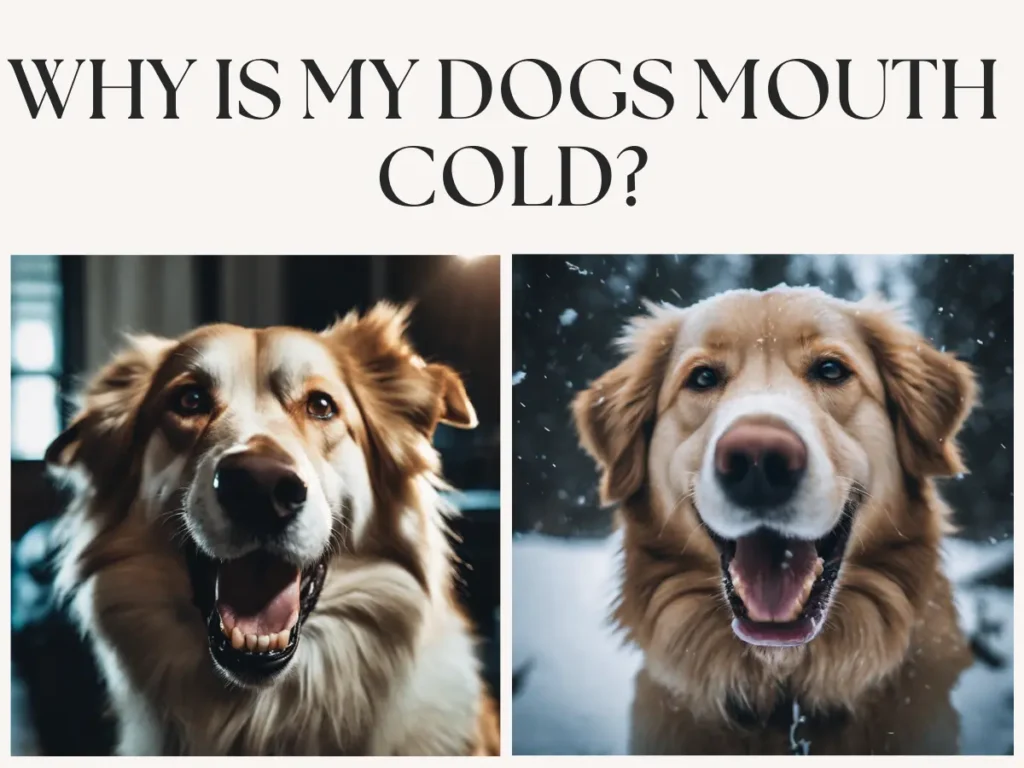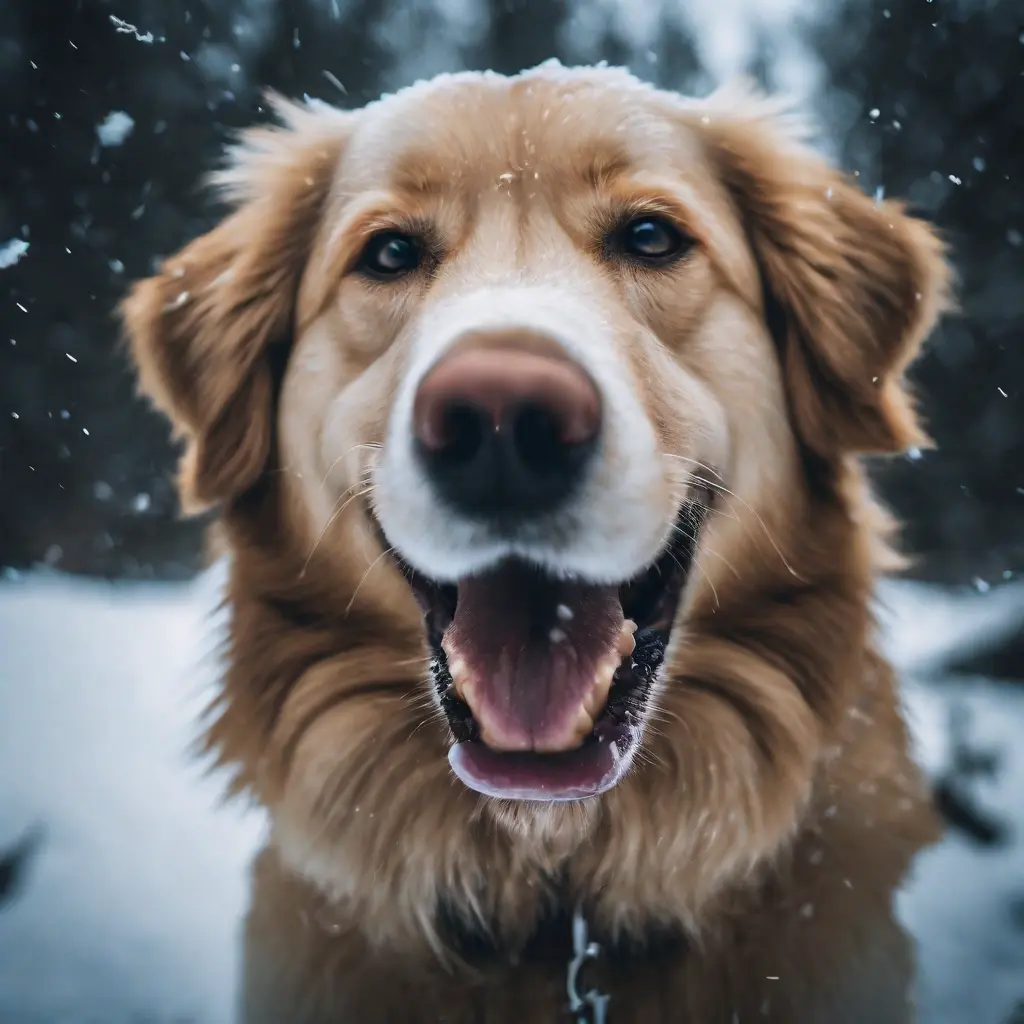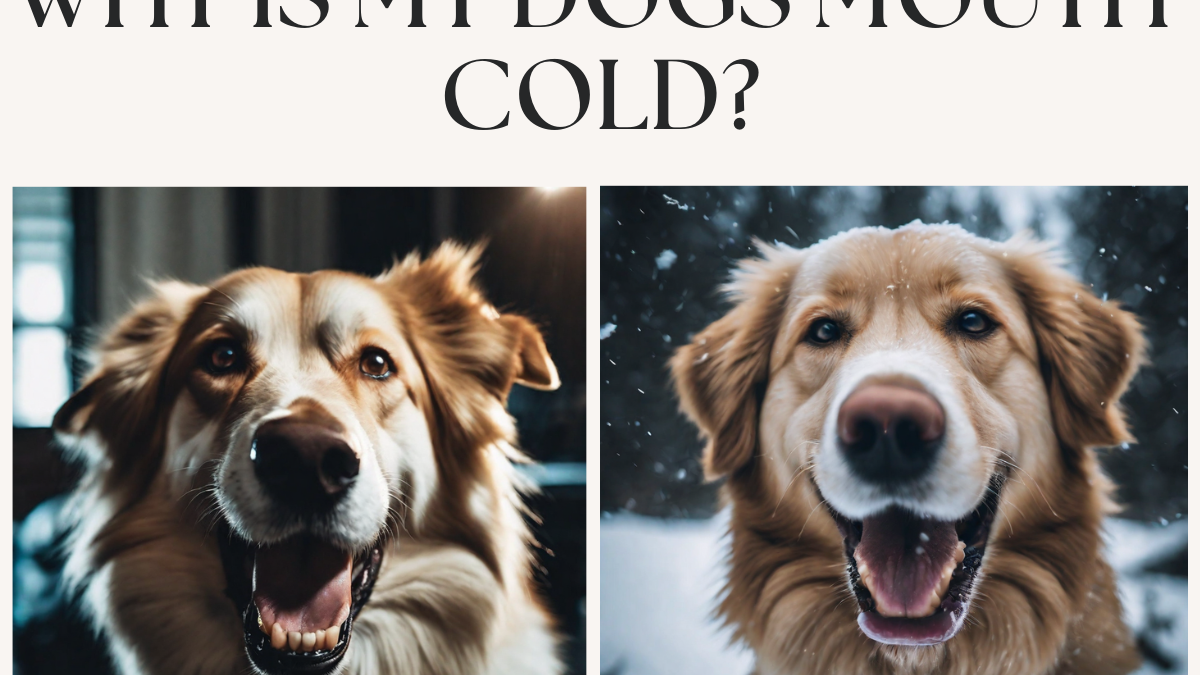As a pet owner, you may have noticed that your dog’s mouth can feel cold to the touch at times. While this may not seem like a cause for concern, it’s natural to wonder: Why is my dog’s mouth cold? The answer to this question may not be as simple as you think. In fact, there could be several reasons why your dog’s mouth feels cold, and some of them may require attention from a veterinarian. Additionally, you may have also noticed that your dog’s mouth appears white at times. So, why is my dog’s mouth white? In this blog post, we will explore the possible reasons for both of these occurrences and what they could mean for your furry companion’s health.

Table of Contents
Understanding Your Dog’s Body Temperature: The Basics
Understanding your dog’s body temperature is important for recognizing potential health issues. Like humans, dogs have a normal body temperature that helps maintain their overall health and well-being. While humans have an average body temperature of around 98.6°F, dogs typically have a slightly higher normal body temperature, ranging from 99.5°F to 102.5°F.
To measure your dog’s body temperature, you can use a digital thermometer designed specifically for pets. It’s important to remember that your dog’s temperature can vary depending on factors such as their breed, age, activity level, and environment. Understanding what is normal for your individual dog is key to recognizing any abnormalities.
The most accurate way to measure your dog’s body temperature is rectally. You can do this by applying a small amount of lubricant to the thermometer and gently inserting it into your dog’s rectum, about an inch or two. Be sure to hold onto the thermometer so that it doesn’t slip further inside. It’s important to approach this process with caution and gentleness to avoid causing any discomfort to your dog.
Once the thermometer is in place, hold it there for about one to two minutes or until it beeps, indicating that the reading is complete. Record the temperature and compare it to the normal range mentioned earlier. If your dog’s temperature is outside of this range, it could indicate a potential health issue and may require a visit to the veterinarian.
In addition to measuring body temperature, it’s important to be aware of other signs of abnormal temperature in your dog. These signs can include excessive panting, shivering, lethargy, vomiting, or diarrhea. If you notice any of these symptoms along with a cold mouth, it could indicate that your dog’s body temperature is lower than normal.

Why Is My Dog’s Mouth Cold? Common Causes
If you’ve ever touched your dog’s mouth and felt that it’s cold, you may be wondering why. While it’s natural for dogs to have a slightly cooler body temperature than humans, there are a few common reasons why your dog’s mouth might feel particularly cold.
One possible cause is simply that your dog is feeling relaxed. Just like humans, dogs can experience changes in body temperature based on their emotional state. When your dog is calm and relaxed, their body temperature may decrease slightly, causing their mouth to feel cooler to the touch.
Another reason for a cold mouth could be related to the weather. Dogs have a natural cooling mechanism in their mouths, so when it’s hot outside, they may produce more saliva and pant more to regulate their body temperature. This increased saliva production can make their mouth feel colder.
Dehydration is another potential cause of a cold mouth. When dogs don’t drink enough water, they can become dehydrated, which can cause their mouth to feel cool. If you suspect your dog may be dehydrated, it’s important to encourage them to drink water and monitor their water intake closely.
Lastly, certain health conditions can also cause a dog’s mouth to feel cold. Hypothermia, for example, is a condition in which a dog’s body temperature drops dangerously low. In addition to a cold mouth, signs of hypothermia may include shivering, lethargy, and a weak pulse. If you suspect your dog may be experiencing hypothermia, it’s crucial to seek veterinary care immediately.
While a cold mouth in itself may not always be a cause for concern, it’s important to pay attention to any accompanying symptoms or changes in your dog’s behavior. If you notice any unusual signs or if your dog’s mouth consistently feels cold, it’s always best to consult with your veterinarian. They can provide a proper diagnosis and recommend the necessary steps to keep your furry friend happy and healthy.
Other Related Symptoms to Watch Out for in Your Dog
As a concerned pet owner, it’s important to be vigilant about your dog’s health and pay attention to any unusual symptoms. While a cold mouth in itself may not always be a cause for concern, there are other related symptoms you should watch out for in your dog. These symptoms can provide valuable insight into your dog’s overall health and well-being.
One important symptom to watch out for is excessive panting. While dogs naturally pant to regulate their body temperature, excessive panting could indicate an underlying issue. If your dog is panting excessively, especially when they haven’t been engaging in physical activity, it could be a sign of heatstroke, respiratory problems, pain, or even anxiety.
Another related symptom to be aware of is changes in appetite or thirst. If your dog suddenly loses interest in food or water, it could indicate an underlying health issue. Loss of appetite could be a sign of dental problems, gastrointestinal issues, or even more serious conditions like organ dysfunction. On the other hand, an increased appetite and thirst could indicate conditions like diabetes or hyperthyroidism.
Changes in behavior are also important symptoms to watch out for. If your normally energetic dog becomes lethargic and lacks interest in activities they usually enjoy, it could be a sign of pain, illness, or discomfort. Similarly, if your dog becomes unusually aggressive or exhibits changes in mood or temperament, it could indicate an underlying problem.
Vomiting and diarrhea are additional symptoms to keep an eye out for. While occasional episodes of vomiting and diarrhea are not uncommon, persistent or severe cases could be indicative of an underlying gastrointestinal issue, infection, or even poisoning. If your dog experiences these symptoms along with a cold mouth, it’s important to consult your veterinarian.
Other symptoms to watch out for include coughing, difficulty breathing, limping or lameness, excessive itching or scratching, and changes in urinary habits. Any of these symptoms, in addition to a cold mouth, could signal a health problem that requires attention from a veterinarian.
Remember, as a pet owner, you play a crucial role in monitoring your dog’s health. By being aware of these related symptoms and seeking prompt veterinary care when necessary, you can help ensure that your furry companion stays happy and healthy for years to come.

When Is It Time to Consult a Vet: Recognizing Alarming Signs
As a concerned pet owner, it’s crucial to know when it’s time to consult a vet and seek professional care for your furry friend. While a cold mouth in itself may not always be cause for immediate concern, there are certain alarming signs that should prompt you to take action.
One of the most important signs to watch out for is a consistently cold mouth. While it’s normal for a dog’s mouth to feel slightly cooler than our own, if you notice that your dog’s mouth is consistently cold to the touch, it could indicate a potential health issue. This, along with other accompanying symptoms, should raise a red flag and prompt a visit to the vet.
Another alarming sign to watch out for is a change in behavior. If your dog becomes lethargic, loses interest in activities they usually enjoy, or exhibits unusual aggression or mood changes, it could indicate an underlying problem. Dogs are often adept at hiding signs of illness or discomfort, so any noticeable changes in behavior should not be ignored.
Persistent vomiting and diarrhea are also signs that should not be taken lightly. While occasional episodes of these symptoms may not be cause for immediate concern, persistent or severe cases could indicate a gastrointestinal issue, infection, or even poisoning. If your dog experiences these symptoms along with a cold mouth, it’s important to seek veterinary care.
Difficulty breathing, excessive coughing, limping or lameness, excessive itching or scratching, and changes in urinary habits are additional alarming signs that should prompt a visit to the vet. These symptoms, when combined with a cold mouth, could be indicative of a serious health problem that requires professional attention.
Remember, as a pet owner, you know your dog best. Trust your instincts and if you notice any unusual signs or symptoms, it’s always best to err on the side of caution and consult with your veterinarian. They have the knowledge and expertise to provide a proper diagnosis and recommend the necessary steps to ensure your dog’s optimal health. Your furry friend’s well-being is in your hands, and by recognizing and acting on these alarming signs, you can help them live a happy and healthy life.

General Dog Care Tips: Maintaining Your Dog’s Optimal Health
Taking care of your dog’s health is a top priority as a pet owner. By following these general dog care tips, you can help maintain your furry friend’s optimal health and ensure a happy and fulfilling life.
First and foremost, providing a balanced and nutritious diet is essential for your dog’s overall well-being. Consult with your veterinarian to determine the best type and amount of food for your dog’s specific needs. Be mindful of portion sizes and avoid overfeeding, as obesity can lead to various health issues. Additionally, ensure that fresh water is always available for your dog to stay hydrated.
Regular exercise is another crucial aspect of dog care. Depending on your dog’s breed, age, and overall health, they may require different levels of exercise. Engage in daily walks or play sessions to help your dog burn off excess energy, maintain a healthy weight, and strengthen their muscles and joints. Mental stimulation is equally important, so consider incorporating puzzle toys or training sessions to keep your dog’s mind sharp.
Grooming plays a role in maintaining your dog’s optimal health as well. Regular brushing helps prevent matting and keeps your dog’s coat clean and healthy. Check their ears regularly for signs of infection or irritation and clean them as needed. Dental care is often overlooked but is crucial for your dog’s oral health. Brush their teeth regularly and provide dental chews or treats to reduce plaque and tartar buildup.
Maintaining your dog’s hygiene goes beyond grooming. Regularly check for ticks, fleas, or any signs of skin issues such as redness, rashes, or hot spots. Keep up with vaccinations, flea and tick prevention, and regular vet check-ups to catch any potential health issues early on.
Lastly, ensure your dog’s living environment is safe and comfortable. Provide a cozy and clean bed, and make sure their living space is free from hazards or toxic substances. Keep up with regular cleaning to prevent the buildup of bacteria or allergens.
By following these general dog care tips, you can be proactive in maintaining your dog’s optimal health. Remember, every dog is unique, so consult with your veterinarian for personalized care and recommendations. With your dedication and love, your furry friend will thrive and enjoy a happy and healthy life by your side.
Conclusion
In conclusion, pet owners need to understand why their dog’s mouth may feel cold and what it could mean for their overall health. While a cold mouth in itself may not always be cause for immediate concern, it’s crucial to pay attention to any accompanying symptoms or changes in behavior. Dogs have a normal body temperature that helps maintain their health, so any abnormalities should be addressed.
By understanding your dog’s body temperature and recognizing potential health issues, you can better care for your furry friend. Monitoring your dog’s temperature, watching out for related symptoms, and knowing when to consult a vet are all important aspects of responsible pet ownership. Remember to trust your instincts and seek professional care when needed.
Additionally, maintaining your dog’s optimal health through a balanced diet, regular exercise, grooming, and a safe living environment is crucial. These general dog care tips can help keep your furry companion happy and healthy.
Overall, being a pet owner comes with responsibilities, and staying informed about your dog’s health is a crucial part of that. By staying vigilant, seeking veterinary care when needed, and providing proper care and attention, you can ensure that your furry friend leads a long and fulfilling life by your side.

FAQs: Why is My Dog’s Mouth Cold?
Q: Is a cold mouth in dogs a sign of illness?
A: Not necessarily. In most cases, a dog’s cold mouth is a normal occurrence and not indicative of illness. However, if your dog’s mouth consistently feels unusually cold or if they are displaying other signs of illness, such as lethargy, loss of appetite, or vomiting, it’s advisable to seek veterinary attention to rule out any underlying health issues.
Q: Can dental problems cause a dog’s mouth to feel cold?
A: Yes, dental problems can contribute to a dog’s mouth feeling cold. Issues such as gum disease, tooth decay, or oral infections can affect the overall temperature and condition of the mouth. If you suspect dental problems or notice any signs of discomfort, it’s recommended to have your dog’s teeth and gums examined by a veterinarian.
Q: Are there any other potential causes for a dog’s cold mouth?
A: In addition to natural body temperature regulation and dental problems, other factors can contribute to a dog’s mouth feeling cold. These may include environmental factors, such as cold weather or exposure to cold surfaces. However, if the coldness persists or is accompanied by unusual symptoms, consulting with a veterinarian is advisable to ensure your dog’s health and well-being.
Q: Why is the inside of my dog’s mouth cold?
A: The inside of your dog’s mouth may feel cold due to the natural temperature regulation mechanisms in dogs. Dogs have a higher body temperature than humans, and their mouths may feel cooler as a result. Additionally, factors like panting and the circulation of saliva can contribute to the sensation of a cold mouth.
Q: Should my dog’s tongue be cold?
A: It is normal for a dog’s tongue to feel slightly cooler than their body temperature. Dogs use their tongues for various purposes, including regulating body temperature through panting. As a result, their tongues can feel relatively cool to the touch. However, if the tongue feels excessively cold or your dog appears unwell, it is advisable to consult a veterinarian.
Q: Why does my dog feel a bit cold?
A: There can be several reasons why your dog might feel cold. Environmental factors, such as cold weather or exposure to cold surfaces, can cause your dog’s body temperature to drop slightly. Additionally, certain health conditions, such as hypothermia or circulation problems, can make a dog feel cold. If your dog feels consistently cold or shows other signs of illness, it’s best to consult a veterinarian for a proper evaluation.
Q: What are signs that your dog is cold?
A: Dogs may exhibit various signs when they are cold. These can include trembling or shivering, seeking warmth or attempting to burrow, curling up in a tight ball, lifting their paws off the ground, or showing signs of discomfort. Cold ears, nose, or paws can also indicate that your dog is feeling chilly. Providing your dog with a warm and comfortable environment, such as blankets or a heated bed, can help alleviate their discomfort.


Barking up the wrong tree: why beagles are the worst dogs? - Pawsgal
[…] Opinion: Why Boxers are the Worst Dogs Why is My Dog’s Mouth Cold? Possible Reasons Every Pet Owner Should Know Dogs Prev post Unpopular Opinion: Why Boxers are the Worst […]